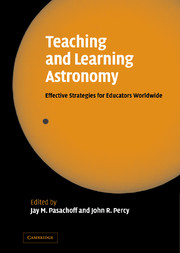Book contents
- Frontmatter
- Contents
- List of illustrations
- Preface
- Introduction
- Part I Astronomy in the curriculum around the world
- Part II Astronomy education research
- Part III Educating students
- Part IV Educating teachers
- Part V Astronomy and pseudoscience
- Part VI Astronomy and culture
- Part VII Astronomy in developing countries
- Introduction
- 15 Astronomy curriculum for developing countries
- 16 Science education resources for the developing countries
- Part VIII Public outreach in astronomy
- Part IX The education programs of the International Astronomical Union
- Part X Conclusions
- Author index
- Subject index
15 - Astronomy curriculum for developing countries
Published online by Cambridge University Press: 18 May 2010
- Frontmatter
- Contents
- List of illustrations
- Preface
- Introduction
- Part I Astronomy in the curriculum around the world
- Part II Astronomy education research
- Part III Educating students
- Part IV Educating teachers
- Part V Astronomy and pseudoscience
- Part VI Astronomy and culture
- Part VII Astronomy in developing countries
- Introduction
- 15 Astronomy curriculum for developing countries
- 16 Science education resources for the developing countries
- Part VIII Public outreach in astronomy
- Part IX The education programs of the International Astronomical Union
- Part X Conclusions
- Author index
- Subject index
Summary
Abstract: The educational needs of countries differ: this is as true in developing countries as it is in developed countries and applies to all subjects taught. Despite these different needs, there are fundamental ideas, concepts, topics and threads of commonality within the curricula of all subjects, including specialized subjects such as astronomy, which can be exploited in the creation of new curricula for developing countries. The recent experience in South Africa of developing a new Outcomes-Based Natural Sciences Curriculum, which includes some astronomy, could well prove to be a useful framework, or starting point, for the creation of an astronomy curriculum for other developing countries, and possibly even developed countries. Since the subject “astronomy” is often seen as elitist, or an unnecessary luxury, several ways of integrating or “hiding” astronomy within existing curricula will also be considered.
Introduction
South Africa's recent history in education has been fairly turbulent as a result of previous government policies, especially in how it affected the education of black people. After the democratization of South African society, it became clear that there was a need to develop a new curriculum, and it was an ideal time to start with a “clean slate.” South Africa had the unique opportunity to make a major paradigm shift in education and make a total break with past structures. One of the aims of this new curriculum was to transform education. This transformation would be not only educational but also political: there was a need to empower previously disadvantaged (black) teachers. This process started in the early 1990s, and the implementation of a newcurriculum began in 1998.
Information
- Type
- Chapter
- Information
- Teaching and Learning AstronomyEffective Strategies for Educators Worldwide, pp. 197 - 205Publisher: Cambridge University PressPrint publication year: 2005
